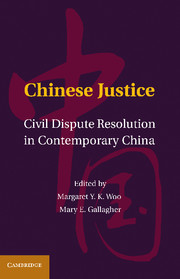Book contents
- Frontmatter
- Contents
- Tables and Figures
- Contributors
- Acknowledgments
- Abbreviations
- Glossary
- Introduction
- PART I LEGAL DEVELOPMENT AND INSTITUTIONAL TENSIONS
- PART II PU FA AND THE DISSEMINATION OF LAW IN THE CHINESE CONTEXT
- PART III LAW FROM THE BOTTOM UP
- Conclusion: Chinese Justice from the Bottom Up
- Index
- References
Introduction
Published online by Cambridge University Press: 05 July 2011
- Frontmatter
- Contents
- Tables and Figures
- Contributors
- Acknowledgments
- Abbreviations
- Glossary
- Introduction
- PART I LEGAL DEVELOPMENT AND INSTITUTIONAL TENSIONS
- PART II PU FA AND THE DISSEMINATION OF LAW IN THE CHINESE CONTEXT
- PART III LAW FROM THE BOTTOM UP
- Conclusion: Chinese Justice from the Bottom Up
- Index
- References
Summary
[I]t is in its legal institutions that the characteristics of a civilized society are most clearly reflected, not only, and not so much, in its substantive law as in the practice and procedure of its courts. Legal procedure is a…ritual of extreme social significance.
If how a society decides its disputes is “a ritual of extreme social significance,” then China's thirty years of legal reform can inform our understanding of how the Chinese state relates to its society and how Chinese citizens relate to one another. Since 1978, China has embarked on legal reforms to promote law as a main mode of dispute resolution. But critics argue that China is establishing legal institutions more to promote economic development and coalesce state power and less to empower ordinary citizens. It is said that ordinary citizens shy away from formal legal mechanisms to resolve disputes because of an historical distrust of the law that is reinforced by recent experiences with Chinese courts. At the same time, the state's distrust of civil society institutions renders bottom-up initiatives unpromising.
This volume takes an on-the ground look at how civil disputes of ordinary citizens are being resolved in China today. In identifying what is going on at the ground level, this volume “disaggregates the Chinese state and society” to focus on the hows and whys – that is, the process of “law in action.”
- Type
- Chapter
- Information
- Chinese JusticeCivil Dispute Resolution in Contemporary China, pp. 1 - 22Publisher: Cambridge University PressPrint publication year: 2011
References
- 3
- Cited by



